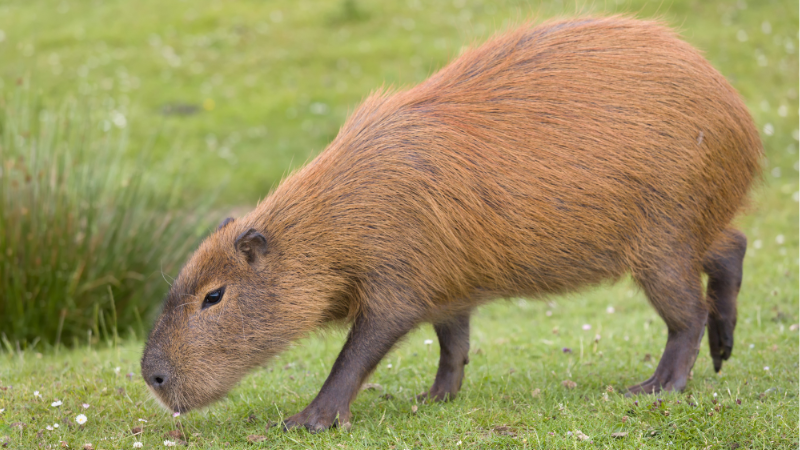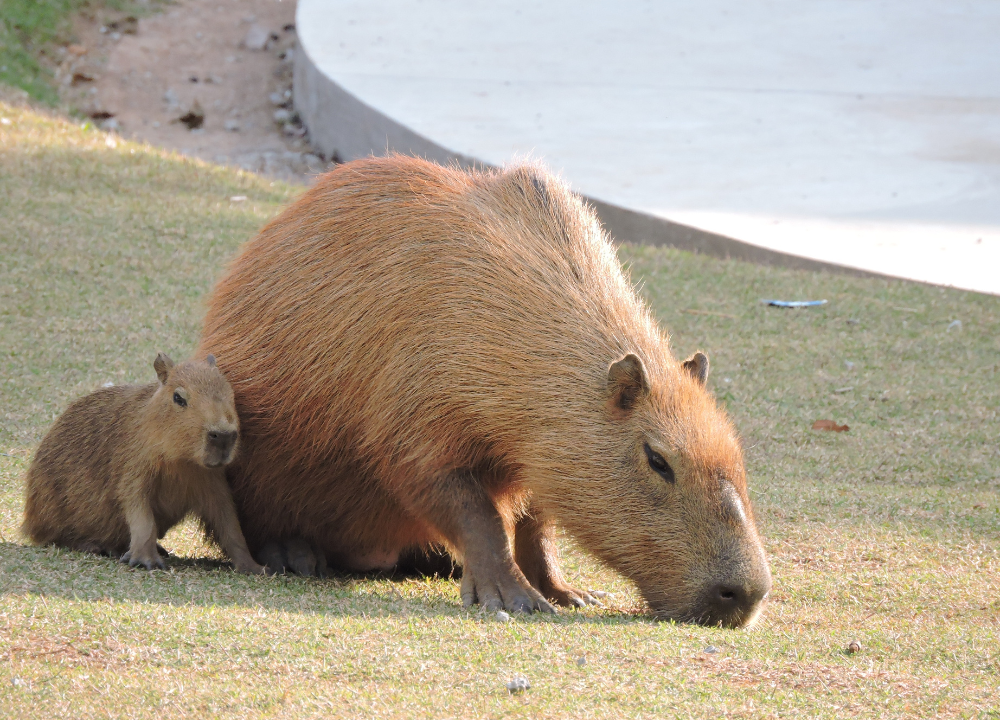No, it is not legal to keep a capybara as a pet in Michigan. In Michigan, it is against the law to own a capybara as a pet.
Capybaras are considered exotic animals and require a special permit to be kept as a pet. The state has specific regulations and laws in place to protect both the animals and the residents. These regulations aim to prevent potential risks and ensure the welfare of animals.
It is important to check and comply with the state laws and regulations before considering owning a capybara or any other exotic animal as a pet in Michigan.
Overview Of Capybaras
Michigan, like many other states, has its own regulations and laws regarding exotic pets. Before considering a capybara as a potential pet in Michigan, it’s important to understand the nature and needs of these unique creatures. In this article, we will provide an overview of capybaras, focusing on their physical characteristics, behavior, and diet. By the end, you’ll have a better understanding of whether owning a capybara is feasible and suitable for you in Michigan.
Physical Characteristics
Capybaras are the largest rodents in the world, known for their semi-aquatic lifestyle and social nature. Here are some key physical characteristics of capybaras:
- Size: Capybaras can grow to be quite large, measuring around 3 to 4 feet long and weighing between 77 and 146 pounds. Their size makes them unable to fit in traditional rodent cages and requires spacious enclosures.
- Appearance: With their stout bodies, short legs, and barrel-shaped torso, capybaras resemble oversized guinea pigs. They have coarse, short fur that can range in color from reddish-brown to grayish-brown.
- Webbed Feet: Capybaras have partially webbed feet, which aid in swimming and navigating through marshy habitats. This adaptation makes them excellent swimmers.
Behavior And Diet
Capybaras are highly social creatures and often live in groups, known as herds, ranging from 10 to 40 individuals. Understanding their behavior and dietary needs is crucial when considering them as pets:
- Social Nature: Capybaras are known for their friendly and docile temperament. They enjoy company and form strong bonds with their human caretakers. However, due to their social nature, it is recommended to keep them with a companion capybara or other compatible species if possible.
- Diet: Capybaras are herbivores, primarily feeding on grasses, aquatic plants, and fruits. A diet high in fiber is essential for their digestive health, and they also require fresh water for both drinking and swimming.
- Behavioral Enrichment: Capybaras require ample space to roam, swim, and engage in natural behaviors. Providing them with a large enclosure or access to a secure outdoor space is necessary to ensure their physical and mental well-being.
While capybaras can make delightful pets for the right owner, it’s important to note that they have specific requirements in terms of space, socialization, and diet. Understanding these factors is crucial before deciding to have a capybara as a pet in Michigan, as it may not be feasible for everyone. Always research and consult with local authorities to ensure compliance with laws and regulations regarding exotic pet ownership in your area.

Legal Regulations In Michigan
In Michigan, ownership of capybaras as pets is not allowed due to legal regulations. Potential pet owners should be aware of the restrictions in place and consider alternative pets that are legal to own in the state.
If you’re considering having a capybara as a pet in Michigan, it’s essential to understand the legal regulations surrounding exotic animals in the state. Michigan has specific laws in place that govern the ownership and possession of exotic animals. These regulations aim to protect the native wildlife and ensure the safety and well-being of both the animals and the public. Familiarizing yourself with these laws is crucial to avoid any legal complications and to provide a suitable and legal environment for your capybara.
Exotic Animal Laws
Michigan’s Exotic Animal Law prohibits the keeping, breeding, and possessing of certain exotic animals unless the owner has obtained the required permits and licenses. The law defines exotic animals as those that are not native to Michigan or not naturally found in the wild in the state. Capybaras fall under this category as they are native to South America. To keep a capybara legally in Michigan, you must ensure compliance with the specific regulations set forth by the state.
Owners must:
- Obtain a permit: To legally keep a capybara as a pet in Michigan, owners must apply for an Exotic Animal Permit from the Michigan Department of Natural Resources (DNR). This permit ensures that the owner meets certain criteria and can provide a suitable habitat for the capybara.
- Provide appropriate enclosure: Capybaras require adequate space, usually in the form of a large enclosed area with access to water for swimming. The DNR may inspect the premises to ensure it meets the necessary standards before issuing the permit.
- Follow guidelines for care and treatment: Owners must adhere to guidelines regarding the care, treatment, and welfare of capybaras. This includes providing proper nutrition, veterinary care, and environmental enrichment for the animal.
Wildlife Rehabilitation
It’s important to note that keeping a capybara as a pet is different from wildlife rehabilitation. If you come across an injured or orphaned capybara in Michigan, it is illegal to keep it as a pet without the proper permits. In such cases, it’s best to contact a licensed wildlife rehabilitator who can provide the necessary care and assistance to enable the capybara’s successful release back into the wild.

Considerations Before Owning A Capybara
Owning a capybara as a pet can be an exciting and unique experience. However, there are several important considerations to keep in mind before making the decision to bring one into your home. From understanding their space requirements to meeting their social needs, it’s crucial to thoroughly research and evaluate whether a capybara is the right pet for you and your lifestyle. In this article, we will explore some key considerations to help you determine if owning a capybara is a suitable choice for you, especially if you reside in Michigan.
Space Requirements
One of the primary considerations before owning a capybara is providing adequate space for them to thrive. Capybaras are the largest rodents in the world, and they need room to roam and explore. In terms of their physical environment, capybaras require a spacious enclosure that mimics their natural habitat. This means having an area with access to both water and land, as capybaras are semi-aquatic animals.
Table:
| Space Requirements | Description |
|---|---|
| Enclosure Size | Capybaras need a large enclosure of at least 8 feet by 16 feet surface area for a pair of capybaras. The more space, the better. |
| Water Feature | A significant portion of the enclosure should be devoted to a pool or pond that is deep enough for the capybaras to submerge and swim comfortably. |
| Land Area | In addition to the water feature, the enclosure should include ample land space for the capybaras to graze, play, and rest. |
Social Needs
Capybaras are highly social animals that thrive in groups. In the wild, they live in large colonies and form strong bonds with their fellow capybaras. Therefore, it’s crucial to consider their social needs before owning one as a pet. Capybaras are happiest when they have the opportunity for social interaction, and this can include both human and animal companionship.
When it comes to owning a capybara in Michigan, you should also consider finding a suitable companion for your pet capybara, as they are less likely to thrive in isolation. Having another capybara as a companion is ideal, but if that is not possible, other domestic pets or even humans who can spend ample time interacting and providing companionship for your capybara can help fulfill their social needs.
It’s important to note that capybaras are not solitary creatures, and ensuring they have ample socialization opportunities is essential for their overall well-being.
By considering these space requirements and social needs, you can make an informed decision on whether owning a capybara is right for you. Remember, capybaras are unique pets that require specialized care and attention. Before bringing a capybara into your home in Michigan, it’s crucial to consult local laws and regulations regarding exotic pets to ensure you adhere to all legal requirements.

Challenges Of Owning A Capybara
Owning a capybara as a pet can be an exciting and rewarding experience, but it also comes with its fair share of challenges. From healthcare and veterinary needs to feeding and housing challenges, there are several factors to consider before bringing these unique creatures into your home in Michigan.
Healthcare And Veterinary Needs
When it comes to the healthcare and veterinary needs of a capybara, it’s essential to find a veterinarian who is knowledgeable and experienced in treating exotic animals. Regular check-ups and vaccinations are crucial to ensure the overall well-being of your pet.
Capybaras can be prone to certain health issues, such as dental problems, obesity, and skin infections. Therefore, keeping a close eye on their oral hygiene, providing a balanced diet, and maintaining a clean living environment can help prevent these issues from arising.
In addition, capybaras are social animals and thrive in groups. It’s important to provide them with ample opportunities for socialization and mental stimulation. Lack of social interaction can lead to stress and behavior problems, so dedicating time and effort to their emotional well-being is essential.
Feeding And Housing Challenges
Feeding a capybara can be a challenge, as their diet mainly consists of fresh fruits, vegetables, hay, and specialized pellets. They require a high-fiber diet, and it’s essential to provide them with a variety of foods to ensure proper nutrition. A capybara’s diet should be carefully monitored to prevent obesity and nutritional deficiencies.
When it comes to housing, capybaras need ample space to roam and explore. They are semi-aquatic animals and need access to shallow water for swimming and cooling off. A large, secure enclosure with a sturdy fence is necessary to keep them safe and prevent escape. Additionally, their living environment should be kept clean and free of any potential hazards.
It’s worth noting that in Michigan, obtaining the necessary permits and meeting specific requirements are crucial to legally own a capybara as a pet. These requirements aim to ensure the safety and welfare of both the capybaras and their owners.
Owning a capybara in Michigan can present various challenges, but with proper knowledge, care, and dedication, it can also be a rewarding experience. Before considering a capybara as a pet, it’s crucial to thoroughly research and understand the responsibility that comes along with it.
| Challenges | Solutions |
|---|---|
| Healthcare and Veterinary Needs | Find a knowledgeable veterinarian and provide regular check-ups and vaccinations. Keep an eye on oral hygiene, diet, and living environment. |
| Feeding | Ensure a high-fiber diet with a variety of fresh fruits, vegetables, hay, and specialized pellets. Monitor their diet to prevent obesity and nutritional deficiencies. |
| Housing | Provide a large, secure enclosure with access to shallow water for swimming. Keep their environment clean and hazard-free. |
- Find a knowledgeable veterinarian for regular check-ups and vaccinations.
- Maintain proper oral hygiene, diet, and living environment.
- Ensure a high-fiber diet with a variety of fresh fruits, vegetables, hay, and specialized pellets.
- Monitor their diet to prevent obesity and nutritional deficiencies.
- Provide a large, secure enclosure with access to shallow water for swimming.
- Keep their environment clean and hazard-free.
Alternatives To Capybara Pets
Looking for alternatives to capybara pets in Michigan? While capybaras are not legal to keep as pets in the state, there are plenty of other unique and legal options available for aspiring pet owners. From rabbits to guinea pigs to chinchillas, there are many furry friends that can bring joy into your life.
While owning a capybara as a pet may not be suitable in Michigan due to legal restrictions, there are several other options you can consider if you’re looking for a unique and exotic pet. From domesticated rodents to alternative exotic pets, let’s explore some exciting options.
Domesticated Rodents
If you’re specifically interested in domesticated rodents, there are a few to choose from. These small critters can make great companions and are relatively low maintenance. Here are a few popular options:
- Gerbils: These adorable creatures are highly social and enjoy interacting with their owners. They are active and curious, making them entertaining pets.
- Hamsters: Hamsters are one of the most popular choices for a small pet. They are nocturnal and excel at keeping themselves entertained with their tunnels and toys.
- Rats: Despite the unfair stigma attached to them, rats are intelligent and affectionate pets. They can even be trained to perform tricks and enjoy being handled.
- Mice: Mice are tiny and require less space compared to other rodents. They are best kept in same-sex pairs or groups to prevent loneliness.
Exotic Pet Alternatives
If you’re inclined toward more exotic pets, there are various fascinating options aside from capybaras. These unique animals will surely add a touch of the extraordinary to your life:
- Fennec Fox: Known for their oversized ears, fennec foxes are small and highly adaptable. They require ample space and a dedicated owner who can provide for their specific needs.
- Hedgehog: Hedgehogs have become increasingly popular due to their adorable appearance. They are generally low maintenance and prefer a solitary lifestyle.
- Sugar Glider: These small, nocturnal creatures are incredibly social and form strong bonds with their owners. They require a specialized diet and plenty of space for climbing and gliding.
- Skunk: While it may come as a surprise, skunks can be domesticated and kept as pets. However, they require special permits and expert care to ensure their well-being.
Before you decide on any alternative pet, it’s crucial to thoroughly research their specific care requirements, legalities, and potential challenges. Additionally, consulting with a local exotic pet veterinarian can offer valuable insights and guidance.
Frequently Asked Questions For Can You Have A Capybara As A Pet In Michigan
What States Is It Legal To Own A Capybara?
It is legal to own a capybara as a pet in certain states such as Texas, Pennsylvania, and Illinois.
Is There Capybara In Michigan?
No, capybaras are not native to Michigan. They are typically found in South America.
What Exotic Pets Are Legal In Michigan?
Michigan allows the ownership of some exotic pets, such as certain reptiles, birds, and small mammals. However, primates and large carnivores are prohibited. It’s important to check the regulations and obtain the necessary permits before acquiring an exotic pet in Michigan.
Is It Ok To Have A Capybara As A Pet?
Yes, it is not recommended to have a capybara as a pet. Capybaras are large and social animals that require specific care and environment. They need a lot of space, companionship, and access to water. They are also illegal to own as pets in some areas.
Conclusion
While capybaras may seem like intriguing pets, owning one in Michigan can pose legal and practical challenges. The state’s regulations prohibit keeping them without a wildlife permit, and their size and specific care requirements make them unsuitable for many households.
Instead, consider learning more about local rescue organizations and other pet options that are better suited to Michigan’s climate and regulations.







